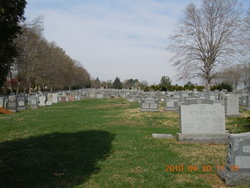I don't think about the dead very much. They are
not a part of my life these days, the way they once were when, as a child, I
would climb into the back seat of my father's late model American made sedan, fight
with my younger sister and brother about who had to sit in the middle over the
hump (never me, I was the oldest and for a while at least, the strongest) and
make the long trek from Northeast Philadelphia to the outreaches of Delaware
County where generations of Jews on my mother's side were buried.
My father's family was buried in Easton, PA in a
small cemetery that in my memory housed only other people with my last name. I
visited this mythical graveyard only once, when my grandfather Harry, the patriarch
of the Rosenzweig clan, father of ten including my father Bill, his first born,
died from the ravages of prostate cancer, an affliction that would one day
claim my father as well.
This time the trek was up scenic Route 611,
following the Delaware River Canal, right under the bridge where (as the story
was always whenever we went to Easton) my father, as a boy, was left to
hitchhike to Philadelphia when his family moved because there was no room for
him in the car. I never did see my father buried there. His second wife, still
nursing some ancient grievance, barred me from his funeral.
When my husband first forwarded me the email about
the "ground breaking sale" at West Laurel Hill
Cemetery, I thought it was a joke. Later, while we were having lunch, he asked me
what I thought about the email he had sent me.
"It was pretty funny," I said.
"But what do you think? Do you want to be
buried there?"
He went on to tell me that this historic 175 year
old cemetery, just two minutes from our house in Bala Cynwyd, PA, had recently
decided to add a Jewish section and that they were running a special on plots.
"Four thousand dollars per grave," he
said. "That includes perpetual care. No annual fees. The kids won't have
to pay anything."
"I really don't want to think about this right
now," I said. "What's the rush anyway?"
"The sale ends tomorrow. After that, the price
goes up to forty-five hundred. That's a thousand dollars more if we wait."
I hadn't ever really given this topic much thought
and I wasn't particularly interested in starting now. Approaching 59, I still
feel vibrant, and I am blessed with good health and robust energy.
"Okay," I said reluctantly, convinced
mostly by my husband's argument that it would save the children aggravation.
 |
| Mt. Sharon Cemetery Springfield, PA |
That and the fact that secretly, I had always
dreaded the prospect of being laid to rest in Mount Sharon, where I imagined
Anti-Semetic teenagers hanging out in the Jewish cemetery getting drunk and
high on my grave.
And I must admit, once there, I was impressed by
the tour of the grounds, and the beauty of the surroundings and the fact that
Laurel Hill was close to home.
We picked our sites, on the aisle, and set far back
from the road. As we were getting ready to sign the papers, a signing process
identical to the one we went through when we bought a time share in Florida or
a condo at the Jersey shore, I had a moment of hesitation.
"I don't know if I can do this," I said.
"What if I change my mind?"
"Don't worry," our overly cheerful sales
person said, sensing that she could lose this commission. "If that
happens, you can always sell it on Craig's List."
And with that, I added my signature, right next to
my husband's on the dotted line.
Death may be permanent, but real estate is
transferable.





